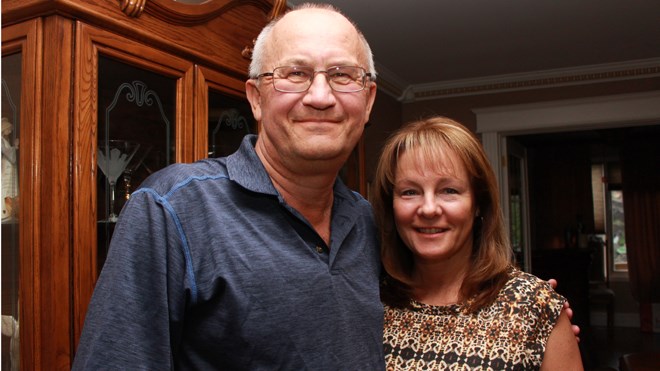Garry Shyminsky and his wife Cindy were shocked when he was diagnosed with Parkinson's disease at the age of 40. That was 17 years ago.
He first noticed a slight tremor in his right pinky finger, and his condition worsened from there.
It took a year before a neurologist in Toronto confirmed he had the progressive disorder of the nervous system.
Garry was diagnosed with Parkinson's disease around the same time actor Michael J. Fox disclosed his own battle with early onset Parkinson's disease to the public, and brought more awareness to the condition.
“It's not just an older person's disease,” said Cindy.
Garry's condition eventually worsened to the point where he experienced severe tremors on the right side of his body, and needed an electric scooter to travel longer distances.
In 2011, after months of thorough medical tests, he became a candidate for a cutting-edge surgery called deep brain stimulation.
Surgeons installed a battery-powered transmitter in his chest, and ran two wires to the top of his head, that connected to electrodes.
Garry has two bumps over his forehead where the electrodes were installed.
The wires then descend from those electrodes deep into the part of his brain that produces the neurotransmitter dopamine.
The motor symptoms of Parkinson's disease result from the death of dopamine-generating cells in the substantia nigra, a region of the midbrain.
Garry's surgically implanted electrodes fool his brain into believing it is producing more dopamine than it actually is, and substantially reduces his tremors.
After his surgery he was able to walk longer distances again, and his tremors have become much less noticeable.
But not everyone with Parkinson's is a candidate for deep brain stimulation, and the results are not always as positive as they have been for Garry.
“We know a couple other people that have also had it and they're back in wheelchairs now,” his wife Cindy said.
Even though his tremors aren't as pronounced, and he has been able to cut back his medications by half, Garry still experiences other symptoms from the disease, including severe fatigue.
He had to quit his job in sales when he was 48, and has not been able to return to work since.
Throughout his experience with Parkinson's disease, Garry and Cindy have been active members of the Parkinson's Support Group of Sudbury (http://www.parkinsonssupportgroupofsudbury.com/).
Through the group, Garry has made lasting friendships with other people going through similar experiences.
The support group also informed he and his wife about the annual Parkinson's Superwalk, which raises funds across Canada for Parkinson's research.
More than 150 people participated in the walk last year in Sudbury, and raised around $22,000 for research.
Nationally, more than 14,000 participants, volunteers and supporters raised around $2.9 million for Parkinson's research in 2014.
The 2015 walk will take place at the Delki Dozzi park in Gatchell on Sept. 12.
Registration is scheduled to start at 10 a.m., and the walk will begin at 11 a.m.
For more information about the walk visit parkinsonsuperwalk.ca.
Join Sudbury.com+
- Messages
- Post a Listing
- Your Listings
- Your Profile
- Your Subscriptions
- Your Likes
- Your Business
- Support Local News
- Payment History
Sudbury.com+ members
Already a +member?
Not a +member?
Sign up for a Sudbury.com+ account for instant access to upcoming contests, local offers, auctions and so much more.
